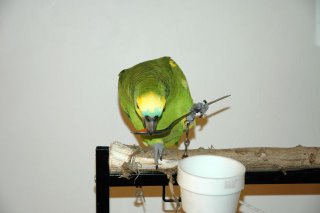
Bodhi Robert, the Blue Fronted Amazon Bodhi's story, compared to Tara's and Manju's, is a decidedly more sober one.
Bodhi came to me as a feather chewing and vicious 5 year old biter. According to the owner, this Amazon is first bought from a local private breeder to a person who is unable to find the time for this baby and returned Bodhi to the breeder. The owner bought this bird as a one year old and kept him for four years till the present.
Increasingly as Bodhi matures, his fiery Amazona hormonal temperament starts exerting itself and poorly equipped on how to deal with such a situation, his owner and family, becoming afraid of his bloodletting bites and unpredictable moods left him bound to his parrot stand; untouchable. The feather chewing starts after his owner decided to give up on parrots altogether, selling away his other Timneh grey, who is Bodhi’s only parrot companion in the household. Somehow, Bodhi must have sensed something because the departure of the grey triggered Bodhi into feather plucking and chewing.
 Bodhi enjoying his bath. Note the chewed wing feathers.
Bodhi enjoying his bath. Note the chewed wing feathers.
I adopted Bodhi, becoming his third care giver and named him “Bodhi”, a Buddhist Sanskrit t
 behaviour and training, a single session with my avian behaviourist friend help transforms both Bodhi and my perception and understanding of each other. Although there are ups and downs, where one mini step forward is sometimes followed by several steps backwards on this journey of confidence and trust building, I’m heartened and glad to say it can still be considered positive and progressive.
behaviour and training, a single session with my avian behaviourist friend help transforms both Bodhi and my perception and understanding of each other. Although there are ups and downs, where one mini step forward is sometimes followed by several steps backwards on this journey of confidence and trust building, I’m heartened and glad to say it can still be considered positive and progressive. Gradually, Bodhi becomes increasingly manageable—the bites from purely defensively and aggressively painful and damaging to increasingly rough in a playful way. The chewing and plucking has all but stopped, with beautiful and complete feathers slowly replacing damaged ones. And with that, he rewards us with golden moments of pleasant surprises and laughter.
 Bodhi “help” us answers the phone ringing with ‘hellos”, greet us “good morning” when we uncover the cage cloth every morning, shake hands with us and say “bye bye” when we leave for work or school. When we’re finally home, he’ll often ask “how are you” as well. There are even the rare occasions when Bodhi mutters “I love you” and “thank you”, so fleetingly we almost miss what he said. Bodhi also has a soft spot for children, getting all excited and charming them with human words to the glee and giggles of little boys and girls.
Bodhi “help” us answers the phone ringing with ‘hellos”, greet us “good morning” when we uncover the cage cloth every morning, shake hands with us and say “bye bye” when we leave for work or school. When we’re finally home, he’ll often ask “how are you” as well. There are even the rare occasions when Bodhi mutters “I love you” and “thank you”, so fleetingly we almost miss what he said. Bodhi also has a soft spot for children, getting all excited and charming them with human words to the glee and giggles of little boys and girls. I will be sending his previous owner some photos of Bodhi once he regain his complete new plummage because this is the only request he made of me that once Bodhi recover from his chewing habit, to send him photos of Bodhi fully feathered. I can see that he really love the bird but just that due to to inappropriate circumstances, knowledge and skills to make him flourish.
Bodhi's previous name is Baby, so actually I have 3 Baby at home. Baby the macaw, Baby the Amazon and Baby my siamese sable holland dwarf rabbit!
Life with an Amazon, particularly a veteran one that has been through human induced bad experiences and survived, is somewhat like the bird itself—predictably unpredictable. They demand a respect for their tendencies towards shrill-loud calls, their aggressive hormonal behaviours, mood swings, needs and wants. In return, they give you themselves. What more can we ask for from a fellow intelligent creature?
If anything, Bodhi teaches me an important lesson in life: with understanding comes love. For verily, to love an Amazon, is to understand them. Perhaps the same could be said for all our other parrots, companion animals and fellow humans?
No comments:
Post a Comment